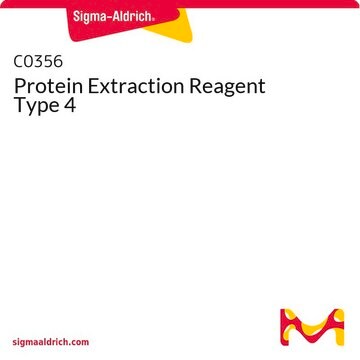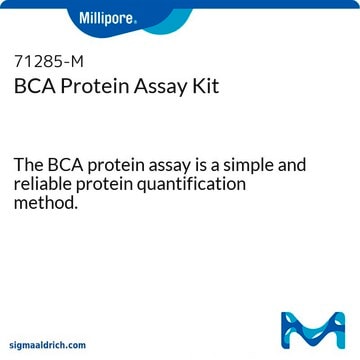2100
Protein-Concentrate Kit (Micro)
Protein-Concentrate Kit (Micro) is suitable for concentrating proteins for running gels, raising antibodies, protein purification, protein assays & other applications.
Iniciar sesiónpara Ver la Fijación de precios por contrato y de la organización
About This Item
UNSPSC Code:
12161503
eCl@ss:
32161000
Productos recomendados
manufacturer/tradename
Chemicon®
technique(s)
protein purification: suitable (concentration)
application(s)
sample preparation
shipped in
ambient
General description
The Chemicon Protein-Concentrate kit uses a proprietary reagent Universal Protein Precipitation Agent (UPPA). Protein solutions as dilute as 1 ng/mL can be quantitatively concentrated into a small volume. Protein precipitation is not effected by the presence of detergents, chaotropic, or other common laboratory agents. After precipitation, the precipitate is suspended in a small volume of Precipitate Suspension Buffer supplied with each kit. If the protocol is followed correctly, the recovery is generally 100%. There are enough reagents for concentrating up to 10 mL of dilute protein solution.
Packaging
10 samples
Components
UPPA-I 30 Ml
UPPA-II 30 mL
OrgoSol Buffer 50 mL
UPC-Wash 2.0 mL
UPC-SEED 0.3 mL
Precipitate Buffer I 2.0 mL
Precipitate Buffer II 0.5 mL
UPPA-II 30 mL
OrgoSol Buffer 50 mL
UPC-Wash 2.0 mL
UPC-SEED 0.3 mL
Precipitate Buffer I 2.0 mL
Precipitate Buffer II 0.5 mL
Storage and Stability
Store at room temperature for up to 6 months from date of purchase. To avoid possible microbial contamination, dispense all solutions aseptically.
Legal Information
CHEMICON is a registered trademark of Merck KGaA, Darmstadt, Germany
Disclaimer
Unless otherwise stated in our catalog or other company documentation accompanying the product(s), our products are intended for research use only and are not to be used for any other purpose, which includes but is not limited to, unauthorized commercial uses, in vitro diagnostic uses, ex vivo or in vivo therapeutic uses or any type of consumption or application to humans or animals.
signalword
Danger
Hazard Classifications
Aquatic Chronic 2 - Eye Dam. 1 - Flam. Liq. 2 - Met. Corr. 1 - Skin Corr. 1A - STOT SE 3
target_organs
Central nervous system, Respiratory system
Storage Class
3 - Flammable liquids
Certificados de análisis (COA)
Busque Certificados de análisis (COA) introduciendo el número de lote del producto. Los números de lote se encuentran en la etiqueta del producto después de las palabras «Lot» o «Batch»
¿Ya tiene este producto?
Encuentre la documentación para los productos que ha comprado recientemente en la Biblioteca de documentos.
Custom-designed MLPA using multiple short synthetic probes: application to methylation analysis of five promoter CpG islands in tumor and urine specimens from patients with bladder cancer.
Serizawa RR, Ralfkiaer U, Dahl C, Lam GW, Hansen AB, Steven K, Horn T, Guldberg P
The Journal of Molecular Diagnostics : JMD null
Ankita Anusruti et al.
Obesity facts, 13(1), 66-76 (2020-01-28)
In the literature, obesity is discussed as a determinant of high oxidative stress (OS). Hence, prevention or reduction of obesity could prevent high OS and subsequently serve as a target for "healthy aging." Diacron's reactive oxygen metabolites test (D-ROM) and
Eric W Refsland et al.
Nucleic acids research, 38(13), 4274-4284 (2010-03-24)
The human APOBEC3 proteins are DNA cytidine deaminases that impede the replication of many different transposons and viruses. The genes that encode APOBEC3A, APOBEC3B, APOBEC3C, APOBEC3D, APOBEC3F, APOBEC3G and APOBEC3H were generated through relatively recent recombination events. The resulting high
Tbr1 regulates regional and laminar identity of postmitotic neurons in developing neocortex.
Bedogni F, Hodge RD, Elsen GE, Nelson BR, Daza RA, Beyer RP, Bammler TK, Rubenstein JL, Hevner RF
Proceedings of the National Academy of Sciences of the USA null
Natronorubrum sediminis sp. nov., an archaeon isolated from a saline lake.
Gutierrez MC, Castillo AM, Corral P, Minegishi H, Ventosa A
International Journal of Systematic and Evolutionary Microbiology null
Nuestro equipo de científicos tiene experiencia en todas las áreas de investigación: Ciencias de la vida, Ciencia de los materiales, Síntesis química, Cromatografía, Analítica y muchas otras.
Póngase en contacto con el Servicio técnico











